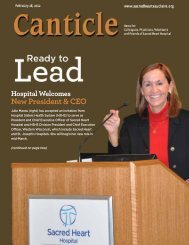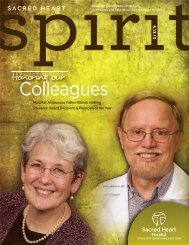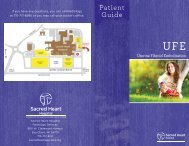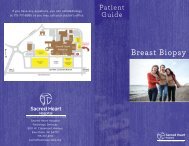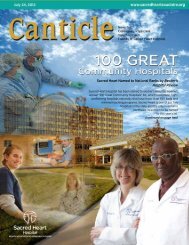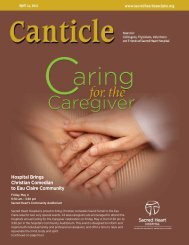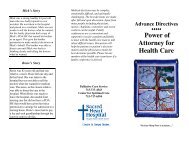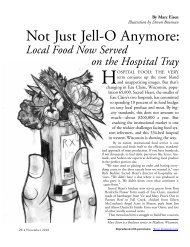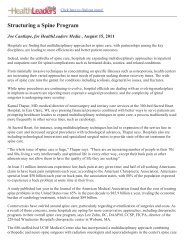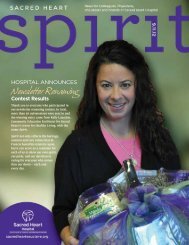PET/CT - Sacred Heart Hospital
PET/CT - Sacred Heart Hospital
PET/CT - Sacred Heart Hospital
You also want an ePaper? Increase the reach of your titles
YUMPU automatically turns print PDFs into web optimized ePapers that Google loves.
If you have any questions, you can call Radiology<br />
at 715-717-6985 or you may call your doctor’s office.<br />
Patient<br />
Guide<br />
<strong>PET</strong>/<strong>CT</strong><br />
Positron Emission Tomography/<br />
Computerized Tomography<br />
<strong>Sacred</strong> <strong>Heart</strong> <strong>Hospital</strong><br />
Radiology Services<br />
900 W. Clairemont Avenue<br />
Eau Claire, WI 54701<br />
715-717-4151<br />
sacredhearteauclaire.org
<strong>PET</strong>/<strong>CT</strong> Scan<br />
<strong>PET</strong>/<strong>CT</strong> scan is a blend of two scans – a computed tomography (<strong>CT</strong>)<br />
scan and a positron emission tomography (<strong>PET</strong>) scan – in one test.<br />
A <strong>PET</strong>/<strong>CT</strong> scan can create a more complete picture than either test<br />
can give.<br />
The <strong>PET</strong> scan shows changes in how your body is working and how<br />
your cells are using sugar for energy. The <strong>CT</strong> scan shows the size<br />
and shape of organs inside your body. The combined test shows<br />
more clearly the changes that may be occurring in your body. <strong>PET</strong>/<br />
<strong>CT</strong> can give information to your doctors which will help them create<br />
a plan for your treatment.<br />
Before the Test<br />
• Do not eat or drink anything except water for 6 hours before your test.<br />
• If you are a diabetic taking insulin, let us know ahead of time so<br />
we can work with your doctor to decide the safest way for you to<br />
prepare for your test.<br />
• The last meal you eat before your exam should be a high protein<br />
and low carbohydrate meal. For example, eat foods high in protein<br />
such as beef, pork, baked chicken, fish, cheese or eggs.<br />
• Do not eat foods high in carbohydrates such as pasta, potatoes,<br />
rice or bread. Do not eat foods with a lot of sugar, such as fruit,<br />
sweets or candy.<br />
• Take your morning medicines with water only.<br />
• Do not use chewing gum or nicotine (cigarettes, cigars, pipes, or<br />
chewing tobacco) the day of the test.<br />
• Do not do hard, physical activity or exercise for 24 hours before the test.<br />
• Wear loose clothing without a lot of metal objects, such as<br />
zippers, buckles or snaps.<br />
• Please tell us if you are pregnant or breast feeding before the test.<br />
During the Test<br />
When you arrive, your test will be explained to you. You can ask any<br />
questions you have about the test, its risks, or how it will be done.<br />
Once your questions have been answered, you will have an IV put<br />
into a vein in your arm. A small amount of radioactive substance will<br />
be put into the IV. You will then sit or lie quietly for about 45 minutes<br />
to let the substance travel through your body. You will not feel any<br />
side effects from the substance and it will leave your body in about<br />
6 hours.<br />
During the test you will lie very still on a table that will move slowly<br />
through the scanner as it gets the information needed to make the<br />
pictures. The scan takes about thirty minutes, but plan on a total of<br />
2 hours from the time you arrive to the end of the test.<br />
After the Test<br />
You may leave as soon as the test is done. Unless told otherwise,<br />
you will be able to eat and drink right away after the test. Be sure<br />
to drink a lot of water soon after the test to help remove any of the<br />
radioactive substance that may still be in your body.




